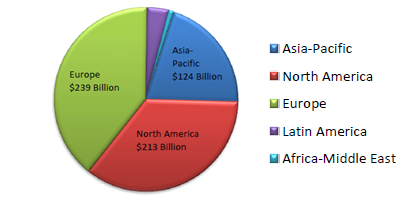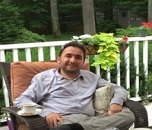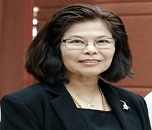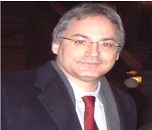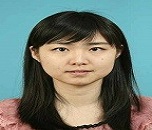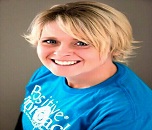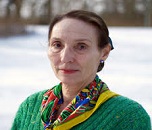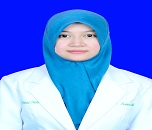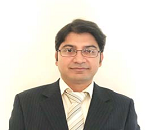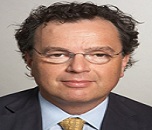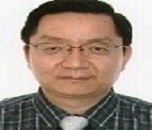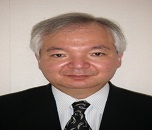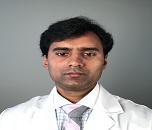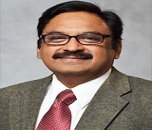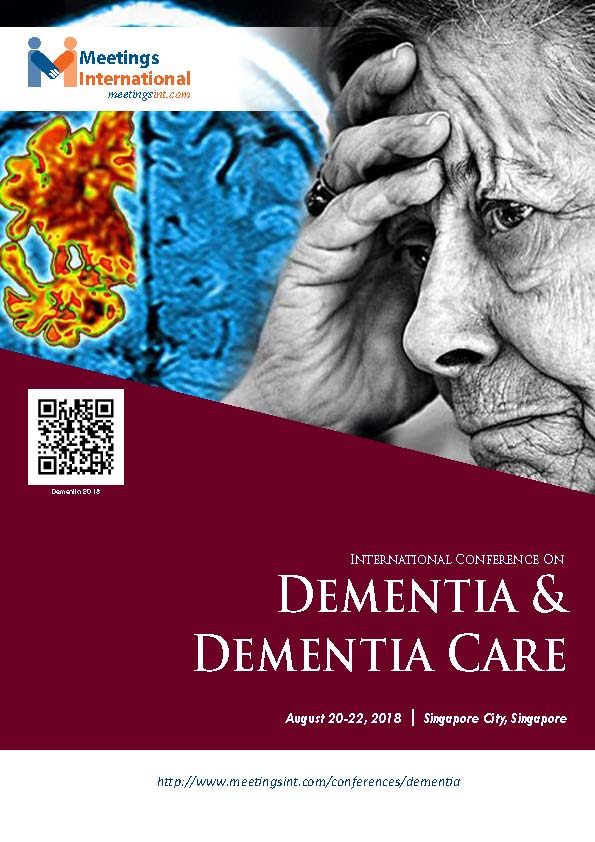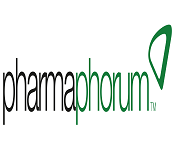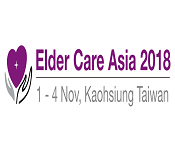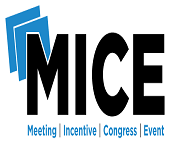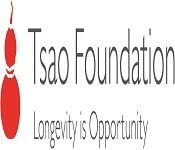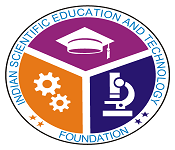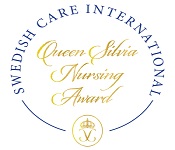
Dementia 2018
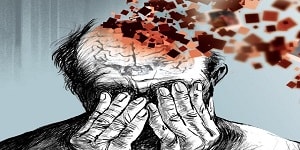
Theme: Reconnoitering the Challenges concerning Dementia Research and Care
Dementia and Dementia Care Conference 2018:
Meetings International proudly announces the “International Conference on Dementia and Dementia Care” which is going to be held on August 20th to 21st, 2018 at Singapore city, Singapore. The theme of the conference is “Reconnoitering the Challenges concerning Dementia Research and Care” that covers wide range of critically important sessions.
The conference will inspire delegates to explore more innovative and creative ways to improve the quality of life and support of people, of all ages, living with all forms of dementia.
Meetings International (Meetings Int.) is a global leader in producing high quality conferences, meetings, workshops and symposia in all major fields of science, technology and medicine. Since its inception, Meetings Int. has been associated with national and international associations, corporations and high level individuals, dedicated to host world class conferences and events.
It supports broad scope research and peer review at a broad range of specialists around the world. Through inspiring sessions and tons of networking, you will learn to be even more audacious and bold than you are now and free to grow your mind, grow your business, and grow your bottom-line.
Why to Attend Dementia Conference 2018?
International Conference on Dementia & Dementia Care 2018 will conduct presentations by the researchers in the field of neuroscience and neurology and will unite overall recognized professors, scientists, doctors and students. It will include wide range of topics like Dementia, Dementia Care, Alzheimer’s Disease, Treatment Strategies & Drug Development, Clinical Trials in Dementia, Biomarkers for Dementia, Animal Models for Dementia Research, Therapeutic Approach towards Dementia, Neuroimaging, Recent Advancement in Dementia Research
The aim of Dementia Conference 2018 is to give a platform for researchers to put forth their research studies and experiences before a global gathering of individuals who have a keen interest in the field of neurodegenerative diseases. Neuroscientist, neurological surgeon, neuro drug manufacturers, students, delegates and officials from various fields of neuroscience are invited to take part in the mind opening sessions, gathering and presentations at this esteemed Dementia Care Conference.
Why Singapore for Dementia Care Conference 2018?
Singapore is currently the only island-city-country in the world. It has a tropical rainforest climate and the temperatures usually range from 22 to 35 °C. It has been dubbed as a nation, which is able to keep stride with the rest of the world, in terms of science, technology, and innovation.
Having the best international airport, airline and the busiest port in the world, it goes to show the world-class standards and achievements of Singapore.
According to a study conducted by the Institute of Mental Health (IMH), one in 10 people aged 60 and above in Singapore have dementia and this is the cause for our concern. The rate is of 5.7% among those aged 65 years and above.
Hence, we need to tackle this growing problem of dementia. So we are organizing this conference in Singapore in order to emphasize prevention and dementia care so that caregivers and persons with dementia can seek medical attention early. We hope you will join us at Dementia Conference 2018 and make this event fruitful.
Dementia Conference | Dementia Care Conference | Alzheimer’s Congress | Neuroscience Workshop | Dementia Meetings | Neurological Disorder Congress | Dementia Symposium | Medical Conference | Dementia Forum | Neurodegenerative Disease Congress | Brain Disease Event
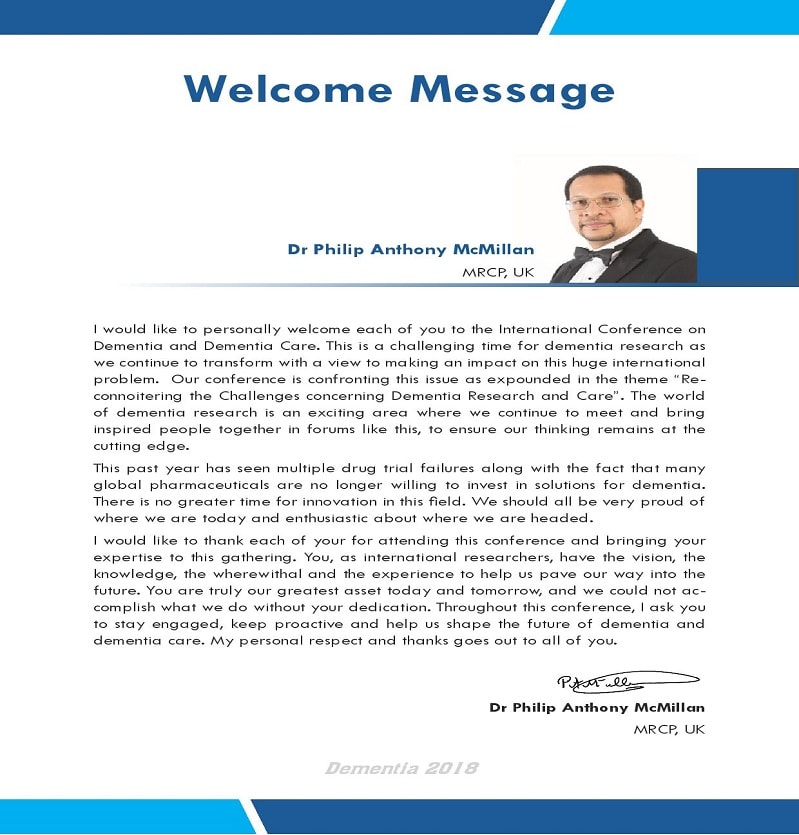
Session 1: Dementia
Dementia is now the leading cause of death that has caused more deaths than heart disease. It is a group of symptoms that leads to brain function decline and memory impairment.
It can be grouped based on the part of brain being affected. The earliest symptoms in "cortical" dementia include difficulty with high-level behaviours such as memory, language, problem-solving and reasoning; these functions tend to be less impaired in "subcortical" dementia.
- Cortical dementia occurs because of damage in the cerebral cortex, the outer layer of the brain. They play a critical role in memory and language. The symptoms usually include severe memory loss. Alzheimer's and Creutzfeldt-Jakob disease are two forms of cortical dementia.
- Subcortical dementia occurs due to the damage to the part of the brain beneath the cortex. The person suffering from it can show changes in their speed of thinking. Usually, people with subcortical dementia don't have forgetfulness and language problems. Parkinson's disease, Huntington's disease, and HIV are two forms subcortical dementia.
Dementia Conference | Dementia Care Conference | Alzheimer’s Congress | Neuroscience Workshop | Dementia Meetings | Neurological Disorder Congress | Dementia Symposium | Medical Conference | Dementia Forum | Neurodegenerative Disease Congress | Brain Disease Event
Session 2: Dementia Care & Awareness
Caring of person with dementia is a difficult task both for families and caregivers. Individual with dementia have progressive brain disorder and memory loss, which makes them difficult to do daily activities. They need support and care.
Caregiver work as a helper or guide in the initial stages of the disease. They provide basic care to the patient, including assistance with bathing, dressing, and going to the bathroom. This is needed both to aid in caring for the patient and to give the caregiver some intermittent relief. Several associations are there which are often helpful in completing these tasks.
Dementia Conference | Dementia Care Conference | Alzheimer’s Congress | Neuroscience Workshop | Dementia Meetings | Neurological Disorder Congress | Dementia Symposium | Medical Conference | Dementia Forum | Neurodegenerative Disease Congress | Brain Disease Event
Session 3: Alzheimer’s Disease
Alzheimer's is a chronic neurodegenerative disease. It is the most common form of dementia and accounts for 60 to 80% of dementia cases. It causes problems with memory, thinking and behaviour. Symptoms usually develop slowly and get worse over time, gradually become severe enough to interfere with day to day work. People with Alzheimer's live an average life of eight years after the symptoms become visible. There is no current cure for Alzheimer's, but treatments for symptoms are available and the research is continued.
Dementia Conference | Dementia Care Conference | Alzheimer’s Congress | Neuroscience Workshop | Dementia Meetings | Neurological Disorder Congress | Dementia Symposium | Medical Conference | Dementia Forum | Neurodegenerative Disease Congress | Brain Disease Event
Session 4: Vascular Dementia
Vascular dementia, also known as multi-infarct dementia (MID) is the second most common cause of dementia in older people. It is a decline in thinking skills caused by conditions that block or reduce blood flow to the brain, depriving brain cells of vital oxygen and nutrients. Thinking problems also may begin as mild changes that worsen gradually as a result of multiple minor strokes or other conditions that affect smaller blood vessels, leading to cumulative damage.
Sudden post-stroke symptoms or changes includes: confusion, disorientation, trouble speaking, and vision loss. It is also difficult to diagnose so it's not easy to know exactly how many people suffer from vascular dementia. Hence early detection is important, as it can be at least partially preventable.
Dementia Conference | Dementia Care Conference | Alzheimer’s Congress | Neuroscience Workshop | Dementia Meetings | Neurological Disorder Congress | Dementia Symposium | Medical Conference | Dementia Forum | Neurodegenerative Disease Congress | Brain Disease Event
Session 5: Neurodegenerative Diseases
Neurodegenerative diseases consist of wide range of disorders, characterized by the progressive degeneration or death of nerve cells. It affects nerve tissue and causes different neuropsychological manifestations as well. It is an umbrella term for a range of conditions which particularly affect the neurons in the human brain.
Few of the different types of neurodegenerative diseases are listed below:
- Dementia
- Alzheimer’s Disease
- Spinal muscular atrophy
- Parkinson’s Disease
- Lewy body disease
- Multiple Sclerosis
The cause of neurodegenerative diseases is currently unknown, but genetic and environmental factors have been shown to play a vital role in their development. Age is one of the major risk factor that is common between all types of neurodegenerative disease as it progresses at older ages commonly.
Dementia Conference | Dementia Care Conference | Alzheimer’s Congress | Neuroscience Workshop | Dementia Meetings | Neurological Disorder Congress | Dementia Symposium | Medical Conference | Dementia Forum | Neurodegenerative Disease Congress | Brain Disease Event
Session 6: Risk Factors and Prevention
A risk factor is any attribute that increases the likelihood of developing a disease. For dementia there are a mixture of factors – some that can be avoided and others that are impossible to control.
Some of the risk factors include age and genetics, medical conditions and lifestyle choices. A person’s risk of developing dementia depends upon a combination of all of these risk factors, such as age or the genes we have inherited from our parents, are beyond our control. Others are things we can change, such as our lifestyle choices – for example, whether we smoke and how much we exercise.
There is no sure way to absolutely prevent the development of dementia instead different activities have been identified which might decrease the risk. These include maintaining normal blood pressure, normal cholesterol, and normal blood sugars.
Staying physically active, avoiding tobacco use or excess alcohol intake, maintaining a healthy weight, and preventing head injuries are also recommended. Researchers have also suggested that people with low levels of vitamin D in their blood are more likely to develop Alzheimer's disease and other forms of dementia.
Dementia Conference | Dementia Care Conference | Alzheimer’s Congress | Neuroscience Workshop | Dementia Meetings | Neurological Disorder Congress | Dementia Symposium | Medical Conference | Dementia Forum | Neurodegenerative Disease Congress | Brain Disease Event
Session 7: Diagnosis and Prognosis of Dementia
There is no one test to identify if someone has dementia. Doctors diagnose dementia based on a careful medical history, a physical examination, laboratory tests, and the characteristic changes in thinking, day-to-day activities and behaviour associated with each type.
It is difficult to determine the exact type of dementia because the symptoms are very similar and brain changes of different dementias can overlap.
Diagnosis can be aided by:
- Cognitive and Neuropsychological tests
- Advanced imaging and Biomarkers
- Psychiatric / Mental status Evaluation
- Computerized Tomography
- Magnetic Resonance Imaging
- Normal brain aging
- Neuropsychology
Dementia Conference | Dementia Care Conference | Alzheimer’s Congress | Neuroscience Workshop | Dementia Meetings | Neurological Disorder Congress | Dementia Symposium | Medical Conference | Dementia Forum | Neurodegenerative Disease Congress | Brain Disease Event
Session 8: Treatment Strategies & Drug Development
Treatment of dementia depends on its cause. In most of the cases there is no cure and no treatment that slows or stops its progression. Memory treatment has a great impact on dementia patients. It utilizes past frequencies and urge patients to compose and clarify past rates which help in keeping up psychological wellness. Physical exercise has shown some benefits in helping to maintain cognition. Staying engaged and participating in social events may also be helpful.
But there are drug treatments that may temporarily improve symptoms. Ultimately, the path to effective new treatments for dementia is through increased research funding and increased participation in clinical studies & drug development.
Dementia Conference | Dementia Care Conference | Alzheimer’s Congress | Neuroscience Workshop | Dementia Meetings | Neurological Disorder Congress | Dementia Symposium | Medical Conference | Dementia Forum | Neurodegenerative Disease Congress | Brain Disease Event
Session 9: Therapeutic Approach towards Dementia
There are numerous ways to categories interventions in dementia care, for instance, by the kind of treatment approach used. The chief grouping is by the therapeutic goal, with three considerable spheres recommended: the maintenance of function, including cognitive functions, the management of behaviours that challenge and the reduction of comorbid emotional disorders.
The range of non-pharmacological ‘interventions’ in dementia care is ample and would include the everyday interactions of cares with the person suffering from dementia, the effect of the physical and social conditions and all manner of ‘therapies’, ranging from art sessions to contact with animals.
- Nonpharmacological interventions
- Antipsychotic Therapy & medication
- Pharmacological alternatives
- Gene Therapies
- Allen Cognitive Level Screen
- Reminiscence therapy
- Occupational Therapy
- Physical and cognitive activities
Dementia Conference | Dementia Care Conference | Alzheimer’s Congress | Neuroscience Workshop | Dementia Meetings | Neurological Disorder Congress | Dementia Symposium | Medical Conference | Dementia Forum | Neurodegenerative Disease Congress | Brain Disease Event
Session 10: Clinical Trials in Dementia
Clinical trials are experiments carried out at clinical research. It can be conducted in people to explore whether a medical strategy or treatment is safe and effective.
There are two types of Alzheimer's treatment trials:
- One aimed at reducing symptoms. During this type of trial, new medicines and variations of existing medicine that reduce the symptoms of Alzheimer's disease are tested.
- Second aimed at slowing or terminating the disease. During this type of trial, new drugs designed to slow or stop Alzheimer's are tested.
Scientists are making great efforts in identifying potential new ways to help diagnose, treat, and even prevent Alzheimer’s and related dementias. Without clinical trials, there can be no better treatments, no prevention and no cure for neurological disease.
Dementia Conference | Dementia Care Conference | Alzheimer’s Congress | Neuroscience Workshop | Dementia Meetings | Neurological Disorder Congress | Dementia Symposium | Medical Conference | Dementia Forum | Neurodegenerative Disease Congress | Brain Disease Event
Session 11: Biomarkers for Dementia
Dementia is now the leading cause of death that has caused more deaths than heart disease. It represents a burgeoning public health problem that already causes untold suffering and threatens to overwhelm health care delivery systems in the coming decades.
One reaction to the approaching pandemic of twisting sickness is the advancement of biomarkers that can help in determination, forecast, choice for clinical trials, and target evaluation of remedial reaction. Imaging, cerebrospinal fluid (CSF) and blood-based biomarkers have the potential to improve the accuracy by which specific causes of dementia can be diagnosed in vivo, but more research is required to improve the efficacy.
Dementia Conference | Dementia Care Conference | Alzheimer’s Congress | Neuroscience Workshop | Dementia Meetings | Neurological Disorder Congress | Dementia Symposium | Medical Conference | Dementia Forum | Neurodegenerative Disease Congress | Brain Disease Event
Session 12: Animal Models for Dementia Research
Dementia is a syndrome with eccentric memory loss and impaired ability to recall events from the past often characterized by Alzheimer's disease. Animal models for dementia or Alzheimer is important to think about the human phenotype and what is being modelled in terms of the animal phenotype. Animal models of dementia, based on the genetics, replicate at least some of the pathology.
Researchers have been successful at modelling very specific aspects of Alzheimer in the mouse for instance plaques, tangles. Multiple approaches have been adopted to create reliable animal models ranging from rodents to non-human primates, where the animals are exposed to a predetermined injury or causing genetic ablation across specific regions of brain suspected to affect learning functions.
- Transgenic models
- Rodent models
- Lesion-induced models
- Spontaneous models
- Genetics associated with translational models
- Translational Research in dementia
- Development of anti-dementia drugs
- Pathophysiological pathways
Dementia Conference | Dementia Care Conference | Alzheimer’s Congress | Neuroscience Workshop | Dementia Meetings | Neurological Disorder Congress | Dementia Symposium | Medical Conference | Dementia Forum | Neurodegenerative Disease Congress | Brain Disease Event
Session 13: Neuroimaging
Although detailed clinical appraisal frames the premise of assessing a patient with psychological disability, structural and functional imaging techniques are logically being used. Neuroimaging can recognize changes to supplement the clinical analysis and help to recognize dementia subtypes. This might be critical for treatment, prognosis and care planning.
New imaging strategies convey the expectation of revolutionizing the diagnosis of neurodegenerative disease to acquire an entire molecular, structural, and metabolic characterization, which could be used to improve diagnosis and to stage each patient and follow disease progression and response to treatment.
Dementia Conference | Dementia Care Conference | Alzheimer’s Congress | Neuroscience Workshop | Dementia Meetings | Neurological Disorder Congress | Dementia Symposium | Medical Conference | Dementia Forum | Neurodegenerative Disease Congress | Brain Disease Event
Session 14: Recent Advancement
Dementia is a progressive, irreversible decline in cognition that, by definition, impacts on a patient pre-existing level of functioning. The clinical syndrome of dementia has several etiologies of which Alzheimer’s disease (AD) is the most common.
Drug development in AD is based on evolving pathophysiological theory. Disease modifying approaches include the targeting of amyloid processing, aggregation of tau, insulin signalling, neuro-inflammation and neurotransmitter dysfunction, with efforts thus far yielding abandoned hopes and ongoing promise. Reflecting its dominance on the pathophysiological stage the amyloid cascade is central to many of the emerging drug therapies.
- Neurotransmitter based
- Neuroprotective
- Anti-inflammatory
- Cognitive enhancers
Dementia Conference | Dementia Care Conference | Alzheimer’s Congress | Neuroscience Workshop | Dementia Meetings | Neurological Disorder Congress | Dementia Symposium | Medical Conference | Dementia Forum | Neurodegenerative Disease Congress | Brain Disease Event
Session 15: Brain Disease & Neuro-oncology
The brain is body’s control center. When your brain is damaged, it can affect your memory, sensation, and even your personality. Brain disorders include any conditions or disabilities that affect your brain it can be any conditions that are caused by illness, genetics, or traumatic injury.
Neuro-oncology is a branch of medicine that involves tumor of the brain and spinal cord. It is the multifaceted specialty focused on the state-of-the-art treatment and advanced developmental research in brain and spinal cord neoplasm and many of which are very hazardous and life-threatening (glioma, pontine glioma, astrocytoma, ependymoma, glioblastoma multiforme and brain stem tumours).
The global central nervous system (CNS) therapeutics market to grow at a CAGR of -5.9% and expected to reach USD 128.9 billion by 2025, which increases in disease ubiquity rates due to increase in population, introduction of new drugs, and increased outgo on healthcare.
Dementia is a neurological disorder in which the individual suffers from loss of memory and other mental abilities severe enough to interfere with day to day life activities. It is caused by physical changes in the brain. It is a syndrome associated with an ongoing decline of brain functioning. Memory loss is the main problem in case of people suffering from dementia. Dementia Conferemce will gather researchers from all over the world, where they can exchange their knowledge and share ideas.
Global Statistics
Worldwide, around 47 million people have dementia, with nearly 60% living in low- and middle-income countries. Every year, there are nearly 10 million new cases.
The estimated proportion of the general population aged 60 and over with dementia at a given time is between 5- 8 per 100 people. The total number of people with dementia is projected to near 75 million in 2030 and almost triple by 2050 to 132 million.
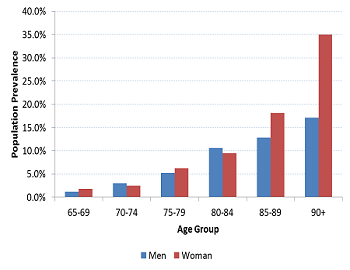
Global Business & Research Value
Dementia has significant social and economic implications in terms of direct medical costs, direct social costs, and the costs of informal care.
The worldwide costs of dementia were estimated at United States (US) $818 billion in 2015, an increase of 35% since 2010. Costs of informal care and the direct costs of social care still contribute similar proportions of total costs, whereas the costs in the medical sector are much lower. The threshold of US $1 trillion will be crossed by 2018.
Only about a third of the population is receiving the therapy or medication needed, mental illnesses cause a huge economic and social burden, it is found that the cost burden of these and other neurological disorders amounted to about 386 billion euros ($555 billion) a year. An estimated 6.8 million people die every year as a result of neurological disorders.
Annual cost of Dementia care
This industry research report identifies Allergan, Eisai, Novartis, and Teva Pharmaceutical Industries as the key vendors in the global dementia treatment market.
This industry research report also presents a competitive analysis of the market by drug class (MAO inhibitors, AChE inhibitors, and Glutamate inhibitors) and by geography (the Americas, APAC, and EMEA).
Market research analysts at Technavio predict that the global dementia and movement disorder treatment market will grow at a CAGR of more than 4% by 2021. This market research analysis identifies the need for disease modifying drugs (DMDs) as one of the primary growth factors for this market.
WHO recognizes dementia as a public health priority. In May 2017, the World Health Assembly endorsed the Global action plan on the public health response to dementia 2017-2025. The plan includes: increasing awareness of dementia and establishing dementia-friendly initiatives; reducing the risk of dementia; diagnosis, treatment and care; research and innovation; and support for dementia cares.
Dementia related Associations and Societies around the Globe
- Alzheimer's Association
- Dementia Society of America
- American Psychiatric Association
- Alzheimer's Family Support Group
- Foundation Alzheimer Aruba (FAA)
- Alzheimer's Australia
- Dementia Research Foundation
- Albanian Alzheimer Society
- Alzheimer Society of Bangladesh (ASB)
- Alzheimer’s Disease Chinese (ADC)
- Alzheimer’s Disease Foundation Malaysia
- Alzheimer’s Disease Association, Singapore
- Alzheimer’s Disease and Related Disorders Association-Thailand
- World Dementia Council Dementia Alliance International
Dementia Related research centers around the Globe
- Dementia Research Centre - UCL
- Centre for Dementia - The University of Nottingham
- Centre for Dementia Studies - BSMS
- Alzheimer Scotland Dementia Research Centre
- UK Dementia Research Institute (UK DRI)
- Centre for Dementia Research - Leeds Beckett University
- Centre for Ageing and Dementia Research
- Centre for Ageing Research in the Environment (Singapore)
- UK Dementia Research Institute
- Dementia Research Institute - Cardiff University
- Global funding body on dementia
- Dementia Discovery Fund
- Global Dementia | JPND
- Dementia – Institute of Mental Health
Dementia Related Units in Singapore
- Lee Kong Chian School of Medicine
- Tsao Foundation - Dementia care system
- Dementia Day Care Centre (AWWA)
- ADA New Horizon Centre
- Montessori for Dementia Care
- Sun Love Senior Care Centre AMK Dementia
- New Horizon Centre – Tampines
- Yongen Care Centre
Targeted Audience
- Neuroscientist
- Neurobiologist
- Neurochemist
- Neurological Surgeon
- Diagnostic Laboratories and Companies
- Dementia related Associations and Societies
- Neurophysiologist and Neuropsychologist
- Biological Psychologist
- Psychiatrist
- Neuroscience Nurse
- Students and delegates
- Neuro drug Manufacturers
- Diagnostic Laboratories and Companies
- Dementia related Associations and Societies
- Dementia Professionals
- Pharmaceutical Companies
Conclusion
Dementia is one of the biggest global public health challenges. It is a brain disorder and the treatment is no far developed completely. This conference will include all the major aspects in the field of dementia and related brain disorder.
This Dementia Conference would be very profitable to all of the attendees and will bring together Scientists, researchers, medical professionals to exchange their research, ideas, concept as well as their knowledge.
References:
https://www.ncbi.nlm.nih.gov/pmc/articles/PMC5232417/
http://www.who.int/mediacentre/factsheets/fs362/en/
http://www.neurologyconference.com/2016/workshop/pre-conference-workshop-on-neurology-and-neurological-disorder
https://www.technavio.com/report/global-dementia-and-movement-disorder-treatment-market
- Dementia
- Dementia Care & Awareness
- Alzheimers Disease
- Vascular Dementia
- Neurodegenerative diseases
- Risk Factors and Prevention
- Diagnosis and Prognosis of Dementia
- Treatment Strategies & Drug Development
- Therapeutic Approach towards Dementia
- Clinical Trials in Dementia
- Biomarkers for Dementia
- Animal Models for Dementia Research
- Neuroimaging
- Recent Advancement
- Brain Disease & Neuro-oncology
- International Journal of Mental Health & Psychiatry
- Research and Reviews in Psychology
12 Organizing Committee Members
16 Renowned Speakers
Wahid Rashidzada
Stony Brook Southampton Hospital,
USA
USA
Vorapun Senanarong
Siriraj Hospital
Mahidol University
Thailand
Dr. Philip Anthony McMillan
Consultant Geriatrics/Stroke - Dementia Specialist - Health Care Systems
UK
Dr. Anthony Tsarbopoulos
Associate Professor at the National and Kapodistrian University of Athens (NKUA) Medical School.
Greece
Sanem Cetin
Gerontologist
Australia
Fang Yuan
Shanghai Mental Health Center
China
Dawn Wiggins
Certified Dementia Practitioner
USA
Dr. Maria Lindau
Licensed psychologist & Assistant Professor, Stockholm University.
Sweden
Fine Farhani Muliati Rahman
Medical Faculty of Halu Oleo University
Indonesia
Dr. Syed Haris Omar
Lecturer in Bioscience at Endeavour College of Natural Health, Melbourne.
Australia
Prof. Giulio M Pasinetti
The Saunders Family Chair and Professor of Neurology at Icahn School of Medicine at Mount Sinai.
USA
Paulan Gordon
Dementia Advocate Author at Dementia Action Alliance
USA
Dr. Feng Ru Tang
Senior Research Scientist
National University of Singapore
Singapore
Hideo Tsukada
Senior Manager at Hamamatsu Photonics.
Japan
Dr. Kranthi Sitammagari
Assistant professor of Internal Medicine,
Campbell University school of osteopathic medicine.
USA
Dr. Rajendra D. Badgaiyan
Professor of Psychiatry at Icahn School of Medicine at Mount Sinai.
USA



